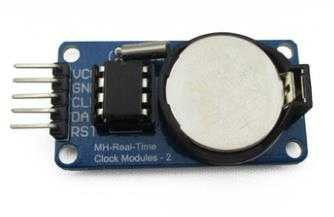
Precios incl. IVA legal más gastos de envío
Listo para envío inmediato, tiempo de entrega aprox. 1-3 días hábiles
- N.º artículo: 135945
Descripción:
El chip de control de tiempo de carga lenta DS1302 contiene un reloj/calendario en tiempo real y 31 bytes de RAM estática. Se comunica con un microprocesador a través de una interfaz serial simple. El reloj/calendario en tiempo real proporciona información de segundos, minutos, horas, días, fechas, meses y años. La fecha de final de mes se ajusta automáticamente por meses con menos de 31 días, incluidas correcciones para el año bisiesto. El reloj funciona en formato de 24h o de 12h con un indicador de AM/PM. La interconexión del DS1302 con un microprocesador se simplifica mediante el uso de comunicación en serie síncrona. Solo se requieren tres cables para comunicarse con el reloj/RAM: CE, I/O (data line), and SCLK (serial clock). Los datos se pueden transferir hacia y desde el reloj/RAM 1 byte a la vez o en una ráfaga de hasta 31 bytes. El DS1302 está diseñado para operar con muy poca potencia y retener información de datos y reloj en menos de 1µW. El DS1302 es el sucesor del DS1202. Además de las funciones básicas de cronometraje del DS1202, el DS1302 tiene características adicionales de dos pines de alimentación para fuentes de alimentación principales y de respaldo, un cargador de goteo programable para VCC1, y siete bytes adicionales de memoria de scratchpad.
CARACTERÍSTICAS
- El reloj en tiempo real cuenta segundos, minutos, horas, fecha del mes, mes, día de la semana y año con compensación del año bisiesto válido hasta 2100
31 x 8 Battery-Backed General-Purpose RAM
Pines I/O de conteo mínimo seriales
Full operación de 2.0V hasta 5.5V
Utiliza menos de 300nA a 2.0V
Single-Byte o Multiple-Byte (Burst Mode)
Transferencia de datos para lectura o escritura de reloj o datos RAM
Interfaz simple de 3 hilos
TTL-Compatible (VCC = 5V)
Rango de temperatura industrial opcional: -40°C hasta +85°C
DS1202 Compatible
Ejemplo sketch 4duino:
|
Code:
/* FILE: ARD_1302_RTC_Example_Sketch_HCMODU0035
DATE: 03/09/13 VERSION: 0.1 REVISIONS: 20/09/13 Created version 0.1 This is an example of how to use the Hobby Components 1302 Real Time Clock module (HCMODU0035). This example uses the RTC library written by Henning Karlsen (http://www.henningkarlsen.com/electronics/). This example sketch demonstrates how to read and write to the RTC module. To connect the module to your Arduino please see the following pinout: PINOUT: MODULE ARDUINO GND GND VCC +5V SCK D4 I/O D3 RST(CS) D2 You may copy, alter and reuse this code in any way you like, but please leave reference to HobbyComponents.com in your comments if you redistribute this code. This software may not be used for the purpose of premoting or selling products that directly compete with Hobby Components Ltd's own range of products. THIS SOFTWARE IS PROVIDED "AS IS". HOBBY COMPONENTS MAKES NO WARRANTIES, WHETHER EXPRESS, IMPLIED OR STATUTORY, INCLUDING, BUT NOT LIMITED TO, IMPLIED WARRANTIES OF MERCHANTABILITY AND FITNESS FOR A PARTICULAR PURPOSE, ACCURACY OR LACK OF NEGLIGENCE. HOBBY COMPONENTS SHALL NOT, IN ANY CIRCUMSTANCES, BE LIABLE FOR ANY DAMAGES, INCLUDING, BUT NOT LIMITED TO, SPECIAL, INCIDENTAL OR CONSEQUENTIAL DAMAGES FOR ANY REASON WHATSOEVER. */ /* Define the DIO pins used for the RTC module */ #define SCK_PIN 4 #define IO_PIN 3 #define RST_PIN 2 /* Include the DS1302 library */ #include /* Initialise the DS1302 library */ DS1302 rtc(RST_PIN, IO_PIN, SCK_PIN); void setup() { /* Clear the 1302's halt flag */ rtc.halt(false); /* And disable write protection */ rtc.writeProtect(false); /* Initialise the serial port */ Serial.begin(9600); } /* Main program */ void loop() { /* Set the time and date to 16:30 on the 3rd of September 2013 */ rtc.setDOW(MONDAY); rtc.setTime(16,30,0); rtc.setDate(3, 9, 2013); /* Read the time and date once every second */ while(1) { Serial.print("It is "); Serial.print(rtc.getDOWStr()); Serial.print(" "); Serial.print(rtc.getDateStr()); Serial.print(" "); Serial.print("and the time is: "); Serial.println(rtc.getTimeStr()); /* Wait before reading again */ delay (1000); } } |
